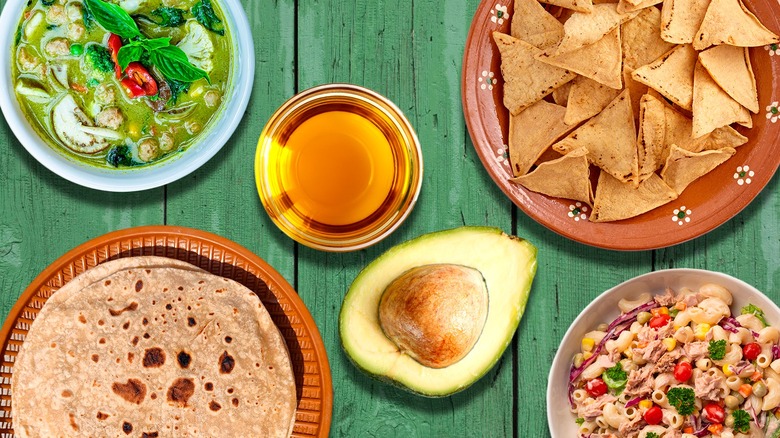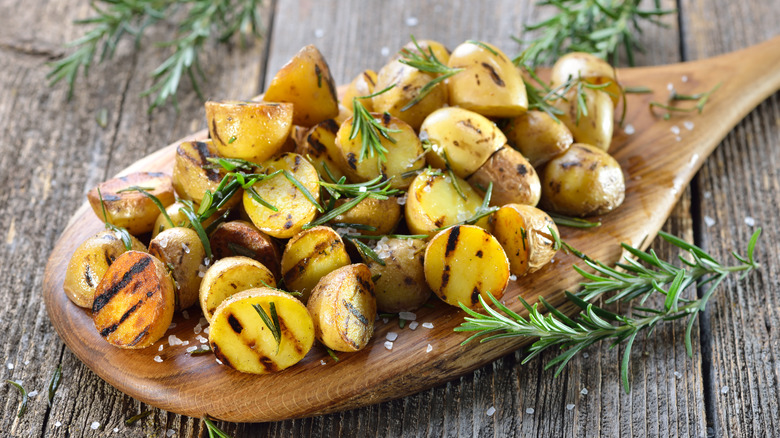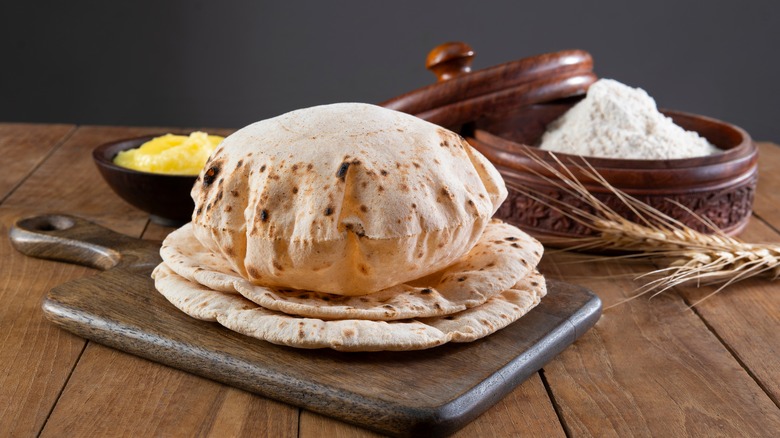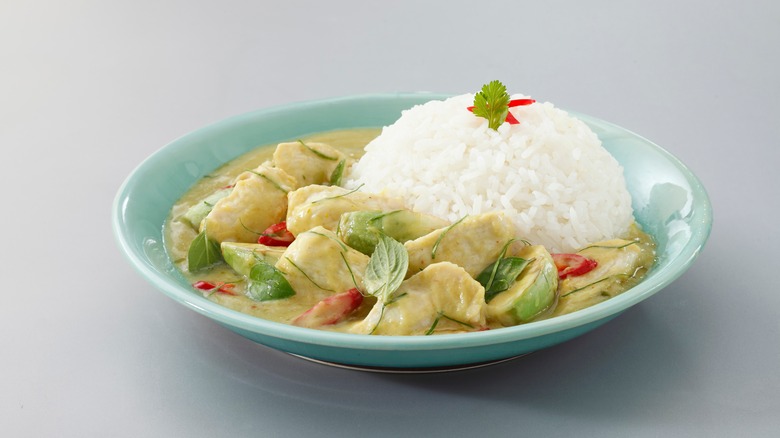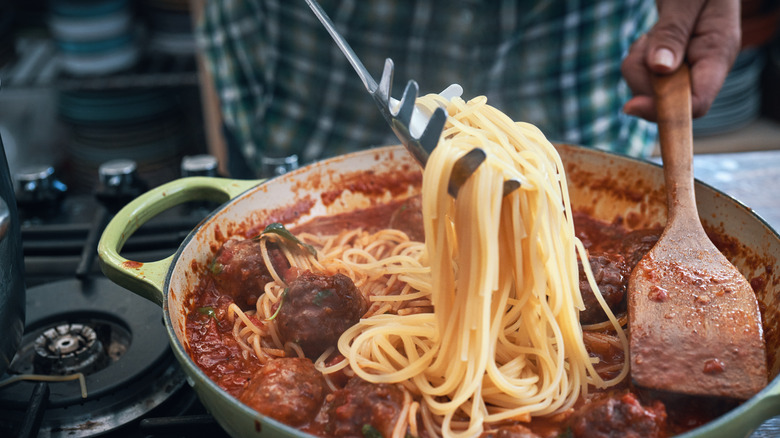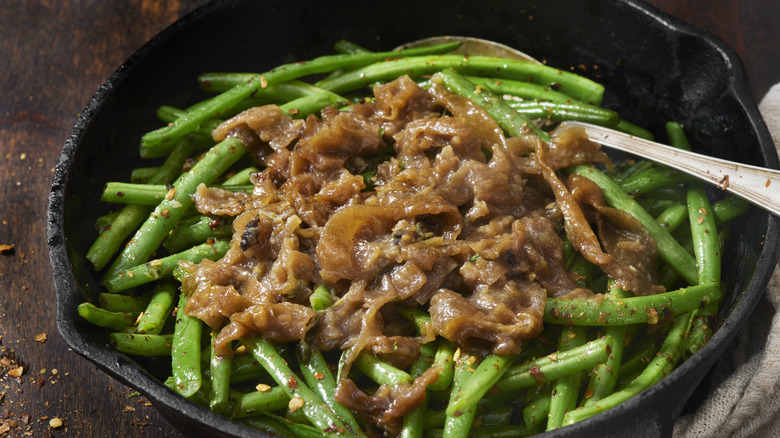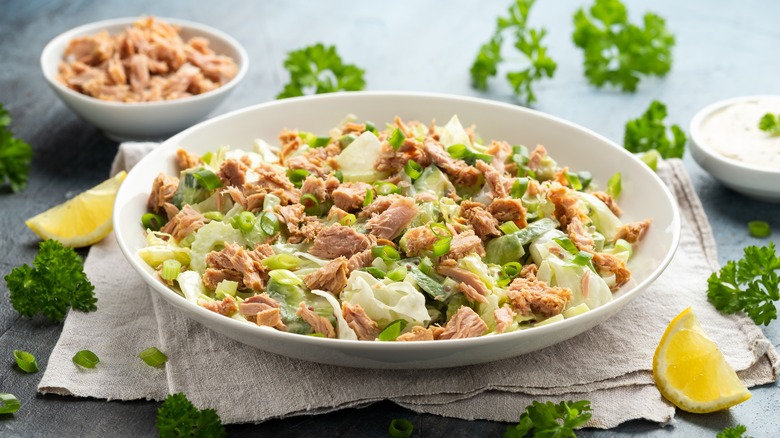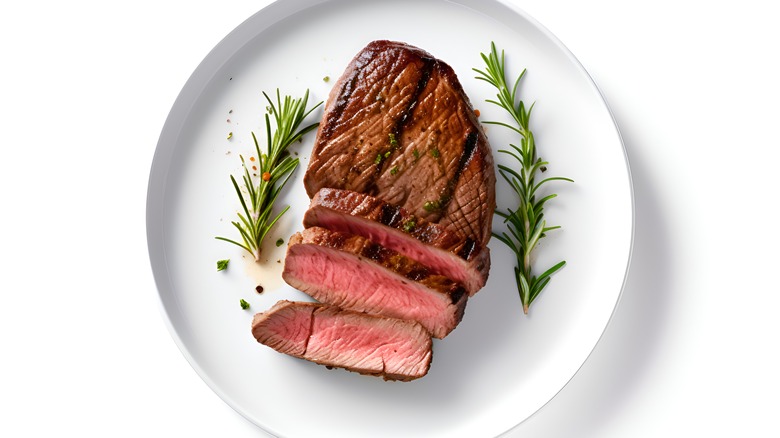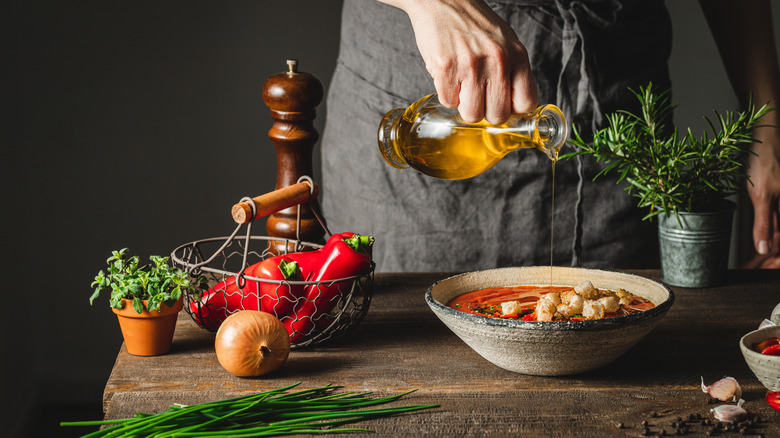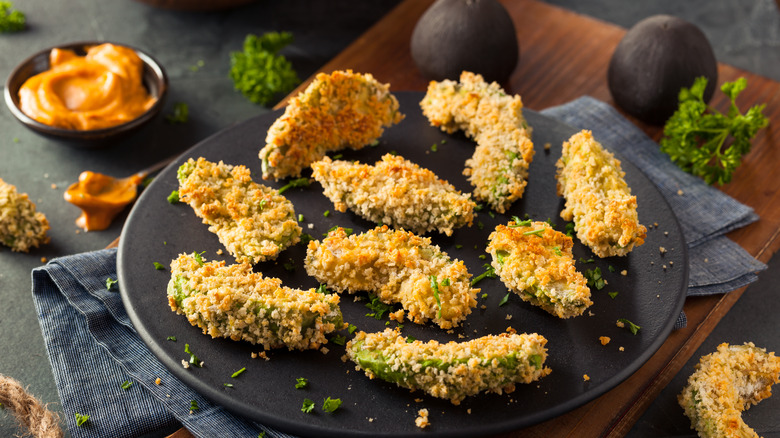11 Best Foods To Cook In Avocado Oil
By now, many people are aware that avocados are one of the superfoods to consider adding to your diet. The green fruit's distinctive creamy flesh is just as unforgettable as the dishes made with it, like guacamole and avocado toast. But there's another significant contribution that it makes to the food world: avocado oil.
Cooking with avocado oil offers many healthy attributes and culinary advantages. Its heart-healthy fatty acids, a high smoke point, and versatile flavor make it the next great item to add to your cooking roster. But this begs the question: What are the best foods and dishes to cook using avocado oil? This question can be attacked from multiple angles.
Avocado oil is considered to be neutral, meaning that it generally (with notable exceptions) does not have a strong flavor on its own. This quality makes avocado oil a perfect substance for cooking anything where you want to let the other ingredients shine. It also is praised for having a high smoke point, giving it exceptional resistance to burning. Plus, as avocado oil grows as a culinary phenomenon, the offerings are becoming more diverse, with both neutral and flavorfully infused oil options entering the market.
From the dough of Indian roti flatbread to an elevated tuna salad to a notably juicy steak, you'll find that there are many foods that will benefit from being cooked with avocado oil. Below, we've rounded up some great dishes and specialties to start with.
Grilled potatoes
Great dishes often have humble beginnings — and one of the greatest foods to cook in avocado oil is the humble potato. Grilling potatoes is one of the most delicious preparations of this starch, and the process involves cooking potatoes in aluminum foil over an open flame. These flames can get very hot, but for taking on the challenge of handling excessive heat, avocado oil is best for grilled potatoes.
As previously mentioned, avocado oil has a high smoke point. At a fairly specific temperature, every fat that we cook with (like cooking oils and butter) begins burning, and thus smoking. This can lead to the disappointment of unpleasant flavors, or even the danger of harmful airborne chemicals. Avocado oil's smoke point can be higher than 500 degrees Fahrenheit, which means that it won't burn below that temperature and can handle most kitchen applications.
When you want to imbue potatoes with that smoky grilled goodness, along with anything else you may cook them with (like onions, peppers, and various seasonings), a neutral oil is key. Avocado oil's typical lack of strong flavor is ideal in shining a spotlight on the grilled potato taste, while providing the perfect texture — as proven in a grilled salt and vinegar potatoes recipe utilizing avocado oil.
Roti dough
Of all the kinds of flatbread, roti may just be the most underrated. As an essential food in India, roti is typically made from stone-ground wheat flour, and versions of it are also staples in Caribbean and Southeast Asian cuisines. Not only is this flatbread a delicious alternative to others like pitas and tortillas, but it is also a great food to cook with avocado oil.
Different doughs provide ample ground for bakers to experiment with avocado oil. Avocado oil's properties can be compared to unsalted butter, and it works well as a substitution in recipes that would call for butter, as well as recipes calling for olive oil. Oil is often added to dough to improve texture and softness. When adding avocado oil to dough, its smooth creaminess and high heat capacity make it an excellent substitute in pizza dough and pastries alike.
Roti is no exception. Whether used in the composition of the dough itself or in brushing the dough while cooking, its texture and neutral taste make it a slam-dunk alternative to olive oil. Its health benefits are yet another reason to make the swap when cooking roti, or in any other doughs that are made with olive oil, such as a roasted garlic focaccia enhanced with fresh rosemary.
Tortilla chips
The universal delight of tortilla chips is only amplified by the ease with which everyone, from star chef to amateur cook, can craft their own. Homemade tortilla chips rarely call for more than a handful of ingredients. These usually are tortillas, oil, salt, and optional lime. Though recipes often call for vegetable oil by default, the benefits of swapping that for avocado oil can't be vouched for enough.
Using avocado oil when making tortilla chips couldn't be easier. If you choose to bake your tortilla chips, then simply brush the tortillas with avocado oil before placing them in the oven. If you fry your homemade tortilla chips, then all you need to do is fry the cut tortillas with avocado oil. After that, you can choose to customize the flavor with salt and spices according to taste, but the best way to season homemade tortilla chips is when the oil is still warm.
Avocado oils can impart a pleasantly grassy flavor to your chips, and this works especially well considering the established relationship between tortilla chips and avocados. Taking this union to the next level, you can even use avocado oil for an oven trick for revamping store-bought tortilla chips.
Thai green curry
If you have never cooked a Thai curry at home, the beginning of that process is when oil most often comes into the fold. Once you have your ingredients prepared, you cook aromatics like garlic and ginger in oil, then incorporate other ingredients like coconut milk and fish sauce. There is even an element of frying the curry paste in some preparations. This foundation of the delicious world of Thai curries is a perfect place to include avocado oil.
There are many ways to increase the creaminess of your curry, including using coconut cream. Cooking Thai curry with avocado oil is another subtle way to enhance the dish's smooth, creamy consistency, given the dreamy texture of avocado oil. There are even Thai green curry recipes that call for adding avocado pieces. What better way to match a Thai avocado curry than with avocado oil?
Experimenting with an avocado oil that is not so neutral in flavor (such as brands with herbaceous qualities or a spicy skew) is another idea for cooking flavorful Thai curry. Plus, using avocado oil makes this light Asian specialty even healthier.
Pasta sauce
Pasta sauce is a source of endless debate. The composition of this seemingly simple foodstuff can vary from elaborate to shockingly precise, yet it often boils down to a few staple items. Tomatoes, onion, and garlic are among these staples, and then, of course, there is olive oil. However, using avocado oil instead of olive oil in pasta sauces is an intriguing option — and this pasta sauce tip is a favorite of celebrity chef Bobby Flay.
Due to its natural resilience against high temperatures, avocado oil is great for sautéing vegetables and aromatics. Cooking aromatics and alliums like onions and garlic while building your pasta sauce presents a great opportunity to swap avocado oil for olive oil. Though olive oil is certainly a boon (or even essential) to the flavor profiles of many pasta dishes, such as aglio e olio, there are times when you might want to let other ingredients speak for themselves.
In those instances, choosing a more neutral flavor — such as that provided by avocado oil — can help set the stage for a brilliant plate of pasta. Try a homemade tomato sauce with an avocado oil base, or create a simple plate of spaghetti coated in avocado oil, garlic, and lemon for a lighter yet utterly tasty pasta alternative to olive oil. What could be more enjoyable than carbo-loading with a heart-healthy twist?
Caramelized onions
If patience is a virtue, caramelized onions are the proof. There are many schools of thought relating to the best ways to prepare this heavenly topping, which generally requires at least 40 minutes at the stove top. Cooks often suggest using yellow, white, or sweet onions for the best results. But what oil should you cook the onions in?
A great experiment in making caramelized onions is cooking the alliums with avocado oil. Some recipes call for a mixture of olive oil and butter to achieve mouthwatering results. However, avocado oil can be used as a direct swap for butter in this mixture — or go with using avocado oil on its own as a great choice for crafting chef-worthy caramelized onions.
One foolproof caramelized onions recipe suggests that a mixture of avocado oil, veggie broth, and patience are the secret to perfecting this topping. Cooking the onions at a higher heat means that you'll need an oil that is up to the test, which also won't distract from the heavenly delight of caramelized onions. So whether you're utilizing caramelized onions for grilled paninis, to enhance soup, or even to make one of the savory toppings you never thought to put on ice cream, cooking onions in avocado oil is an exciting way to get delicious results.
Superfood tuna salad
A favorite sandwich filling that originated as a way to avoid wasting food scraps, tuna is now considered as a superfood fish because of its high concentrations of protein and omega-3 fatty acids. Tuna salad often incorporates oil in some capacity, but this is usually olive oil. In a spruced up tuna salad recipe, olive oil is a component of the salad's dressing, joining mayonnaise, lemon juice, Dijon mustard, salt, and pepper. This mixture then gets combined with tuna, an assortment of veggies, and parsley.
For an even more superfood-forward take on tuna salad, consider the potential benefits of swapping avocado oil in lieu of olive oil. This swap could serve a few purposes, the first of which is the aforementioned health factor. Rich in ultra-healthy oleic acid, as well as antioxidants and unsaturated fat, avocados provide one of the most beneficial oils to add to your dishes. The oil's decadent, silky texture also imparts a pleasing textural component to tuna salad.
And finally, the neutral flavor of avocado oil makes it great for making tuna salad, as it puts the tuna and seasoning flavors center stage. However, using an avocado oil that's infused with herbs or spices can be a fun way to enhance your standard tuna salad preparation.
Steaks
Listed among the great joys in life, steak is a staple of many diets worldwide. Enjoyed high and low, there are cultish sentiments and many schools of thought as to how exactly steaks are best prepared. Many go to bat for the summertime delight of grilled steak, a preparation technique that greatly benefits from the use of avocado oil.
Its high smoke point means that avocado oil can withstand the intense heat from an open flame. When cooking steak this way, brushing the meat with olive oil and then seasoning it before placing it on the grill can help retain moisture under the tremendous cooking temperatures. Avocado oil is tremendously smooth, with a neutral flavor in most cases. Its ability to withstand higher temperatures than other oils also means that while this oil will keep your steak moist and well-seasoned, it will highlight the steak's flavor rather than the oil's flavor.
Plus, avocado oil is lauded for its health benefits, which is not something you can generally say about steak. Making the (albeit slightly) healthier choice of using this oil will keep your meat juicy and let the steak's flavors shine, which is why avocado oil is a great choice — if not the best choice — for cooking steaks.
Avocado oil cake
A mainstay of dessert menus at neighborhood Italian joints and fine dining spots alike, the olive oil cake is a simple, timeless delight. However, nothing in baking is so sacred that it is exempt from experimental deviation. For instance, consider the avocado oil cake.
Bakers revel in avocado oil's properties. Its smooth, creamy texture and neutral taste make this a surefire ingredient to incorporate moisture into baked goods without unnecessary flavor interference. Avocado oil's usefulness as a substitution for butter also makes this an easy swap in recipes calling for it.
Although an avocado oil cake may sound bland due to its neutral taste, it's really an opportunity to nail the texture and build flavor through other methods. Avocados themselves are sometimes used in baking, and are specifically prominent in vegan baked goods. An avocado cake that incorporates both the oil and the fruit itself is a perfect cake-baking experiment for avocado oil. To start out, try a spicy chocolate cake recipe with avocado buttercream — while this particular dessert calls for using vegetable oil, that can be substituted with avocado oil to provide a double dose of the green fruit's nutritional benefits.
Soup and gazpacho
Soup is good food, and it's been around for a long time — archeologists believe that it's been eaten since 6000 B.C. or earlier. While its role in society changed to a meal of convenience after Campbell's introduced condensed soup in the late 1800s, nowadays this wet meal is experiencing a renaissance thanks to online interest and social media influencers. Newly popular soup is also a perfect place to introduce a little avocado oil into your cooking.
With soup and its cold cousin, gazpacho, texture is key. If you're going to be basically drinking your meal, it has to be spot-on. Avocado oil has a creamy, smooth texture that is as beneficial to dishes like soup as it is to products like soap. It's also great to cook soup with avocado oil because the dish often includes sautéed items. For example, cooking veggies in avocado oil before adding them to your soup helps boost the flavor of the vegetables, and lets the broth shine.
Avocado oil also works brilliantly as a finish for a wide variety of your soup and gazpacho creations. Some avocado oil focuses on bringing a nutty, buttery flavor forward, and others are infused with herbs or even a touch of spice. Depending on the flavor of your soup, swapping out olive oil for avocado oil can be just the thing to elevate your bowlful — especially in the case of a green gazpacho recipe that already includes avocado.
Fried or grilled avocado
For fans of sweet-on-sweet, salty-on-salty, and all other complementary flavors, avocado-on-avocado may be worth a try. Avocado is famous for being a filling and versatile food that is vegetarian- and vegan-friendly. For many dishes that require a hearty vegetable component in place of a meat-based ingredient, avocado is a food that can save the day. Dishes like tacos, for example, will sometimes use fried avocado to add a substantial bite. So, the next time you have to fry avocado, consider doing it by using avocado oil.
Avocado oil not only can take the massive heat required to fry foods like a champ, but its health benefits help offset (if ever so slightly) the drawbacks of the frying process. And the flavor of avocado oil here is a win-win. Plain avocado oil is neutral, and will allow the natural flavors of your fried avocado to sing. However, some avocado oils are made with herbaceous infusions or spice-forward flavors in mind. These can add an additional dose of avocado enhancement, or help contrast the fried avocado with brightness and nuance.
Grilling avocados is a great method for preparing them, though in this case it's important to pick fruit that isn't fully ripened. After brushing slices in avocado oil and placing them on the grill, you'll be utilizing the superfood in multiple ways within the same dish — especially when you grill avocado slices for smoky guacamole.
Static Media owns and operates Tasting Table and The Daily Meal.
